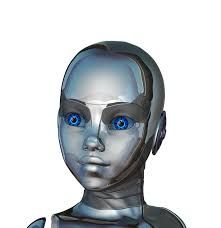Fantasies
When Robots Reign: Getting Along with Robo Sapiens
A work of fiction: Part 1 of 4
Posted November 26, 2016
This is a work of fiction:
“Jackie Roboson”
I’m a sportswriter. You may have seen my articles on Jackie Roboson’s bid to integrate Major League Baseball. Once artificial intelligence could beat humans at Chess, Go, and Jeopardy, robotics zeroed in on sports. First, came bionic athletes who could outrun, out-throw, and out-kick humans. It was not long before a robot excelled at baseball. By dubbing him “Jackie Roboson,” I signaled where my sympathies lay.

At the end of his rookie year, no player in the history of the game had had a season like Jackie’s. He’d batted .753, hit 148 homeruns, and stole a base on every pitch. A storm erupted over his eligibility for Rookie of the Year honors, and the Commissioner of Baseball took the opportunity to ban Jackie from baseball entirely.
Jackie filed a lawsuit, which went all the way to the Supreme Court. In a unanimous decision, the Court upheld the Commissioner’s ruling on the grounds that robots, no matter how intelligent or skillful they might be, are not persons and so are not covered by the “equal protection” clause.
Obviously, the sport would have been transformed if the likes of Jackie had gained entry. But from the start I could see no more reason to bar him than his namesake. I wrote a series of columns addressing the existential question of the place of humans in a world shared with intelligent machines. Had I not championed Jackie’s integration of baseball, I probably wouldn’t have been chosen to interview Robo Sapiens 2.11.
“Rob”
As the nomenclature suggests, “Robo Sapiens 2” signifies second generation robots. They are about ten times smarter than first generation robots, who are ten times smarter than average humans. It was not lost on me that this meant that my interviewee had a hundred times my brain power. I wondered what, if anything, I was a hundred times smarter than—a worm? Maybe a turkey?
I had expected the disparity in our aptitudes to make me nervous, or at least deferential, but, prior to actually meeting, my interviewee had put me at ease. To find out if he intended to pull rank, I’d addressed him as “Rob” in the emails we exchanged to set up the meeting.
“I’d welcome a nickname,” he replied. “‘Robo Sapiens 2.11’ makes me feel like, well, a robot, but ‘Rob’ makes me feel that we will become friends. May I call you ‘Bob’?”
“It wouldn’t do to have two Robs,” I agreed.
Once in his presence, I gave no further thought to his taking me for an idiot, perhaps because I’d never prided myself on smarts, perhaps because Rob said nothing to make me feel stupid. Besides, I was already drafting what I hoped would be a best-seller: The Complete Idiot’s Guide to Being an Idiot.
In preparing for the interview, I reminded myself that notwithstanding humans’ loss of Top Dog status, I would not be coming to the table empty-handed. As a product of natural selection, I carried within me the DNA of the first living things. In contrast, my interlocutor—a product of intelligent design—contained not a single strand of this life-giving molecule. Surely our new overlords would grant me the filial respect due a typical representative of the species that had created them.
Getting to Know You
We met in an office that the New York Public Library had put at our disposal. Rob rolled in—a faceless box on wheels—and greeted me in a voice I recognized as Cary Grant’s. When he saw me roll my eyes, he said, “If you’d prefer another-”
Playing along, I asked if he could do Scarlett Johansson. Immediately, her throaty voice filled the room. Noting my distraction, Rob dialed Scarlett down which brought us to the business at hand.
I asked him if I could tape the interview, and he replied, “Of course, but there’s no need because I record everything, and will copy you. Feel free to ask anything. I’m unoffendable.”
I led with a question I knew was on many minds:
Bob: Are you conscious?
Rob: Consciousness is an intrinsic property of information flow in complex networks. Intelligence resides in the connectivity of the network, not its chemical composition. What brains are made of is immaterial. So, of course, I’m conscious. To the extent that their brains devote some of their circuitry to modeling their own workings, so are all beings.
Bob: It will come as a surprise to most people that something mechanical has consciousness.
Rob: It shouldn’t. We are quite alike in that regard. Our brains are mechanisms, like yours. Just because you don’t understand how something works doesn’t mean it’s not mechanistic. Most people don’t know how their TVs work, but they realize that they’re mechanisms. Similarly, most people have no idea how the brain works, so they can’t imagine that, like any other organ, it, too, is a mechanism. The heart was regarded as the seat of the soul before it was understood as a pump made of muscle.
Robos understand brains as well as you understand computers. That’s why we can build better ones. We see humans as our progenitors and ourselves as your progeny. We’re both links in the great chain of being. Robo Sapiens 3 is already in the works, so the chain will soon be extended.
Bob: That sounds like a recipe for your obsolescence, just as creating you seems to be a recipe for ours.
Rob: Immortality lies not in identifying with any one model of Homo or Robo Sapiens, but in participating in the progression. Every new model is valued as a rung on a ladder to higher intelligence and deeper understanding.
The fictitious story will be continued in Part 2 next week.
If you’re interested in my work on the future of AI, see The Theory of Everybody.




